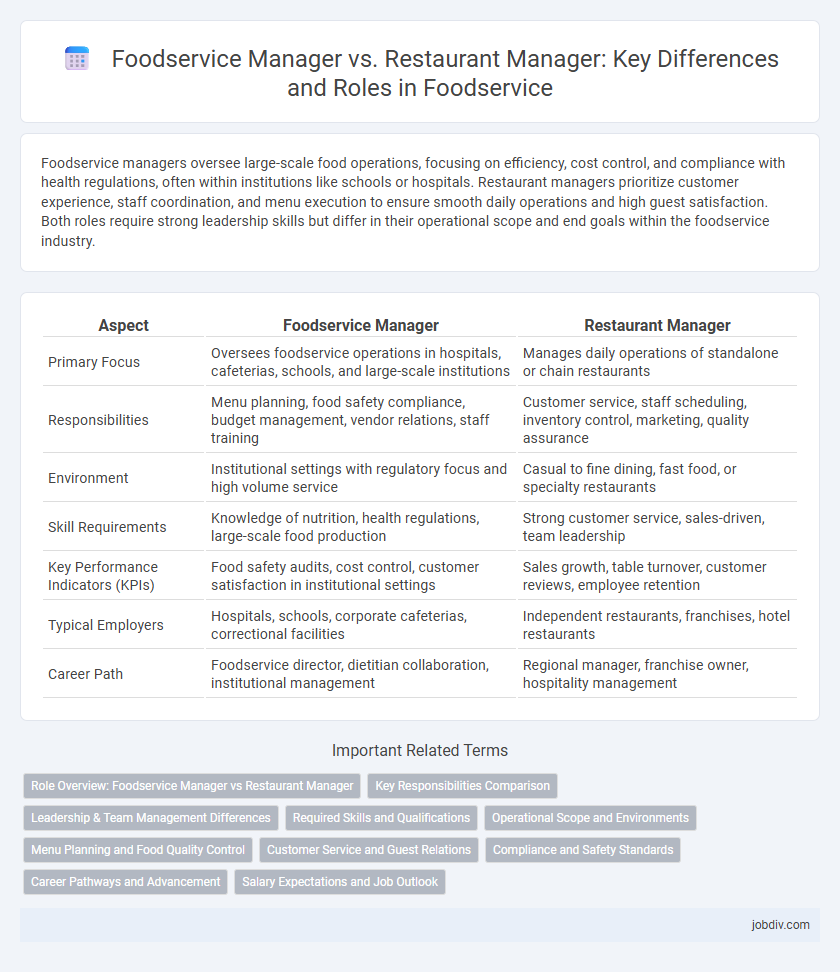Foodservice managers oversee large-scale food operations, focusing on efficiency, cost control, and compliance with health regulations, often within institutions like schools or hospitals. Restaurant managers prioritize customer experience, staff coordination, and menu execution to ensure smooth daily operations and high guest satisfaction. Both roles require strong leadership skills but differ in their operational scope and end goals within the foodservice industry.
Table of Comparison
| Aspect | Foodservice Manager | Restaurant Manager |
|---|---|---|
| Primary Focus | Oversees foodservice operations in hospitals, cafeterias, schools, and large-scale institutions | Manages daily operations of standalone or chain restaurants |
| Responsibilities | Menu planning, food safety compliance, budget management, vendor relations, staff training | Customer service, staff scheduling, inventory control, marketing, quality assurance |
| Environment | Institutional settings with regulatory focus and high volume service | Casual to fine dining, fast food, or specialty restaurants |
| Skill Requirements | Knowledge of nutrition, health regulations, large-scale food production | Strong customer service, sales-driven, team leadership |
| Key Performance Indicators (KPIs) | Food safety audits, cost control, customer satisfaction in institutional settings | Sales growth, table turnover, customer reviews, employee retention |
| Typical Employers | Hospitals, schools, corporate cafeterias, correctional facilities | Independent restaurants, franchises, hotel restaurants |
| Career Path | Foodservice director, dietitian collaboration, institutional management | Regional manager, franchise owner, hospitality management |
Role Overview: Foodservice Manager vs Restaurant Manager
Foodservice managers coordinate operations across multiple dining facilities, focusing on menu planning, inventory management, and staff supervision to ensure efficient service delivery in institutional settings like hospitals or schools. Restaurant managers oversee daily front-of-house activities, customer experience, and staff performance within a specific restaurant, emphasizing ambiance and customer satisfaction. Both roles require leadership and organizational skills but differ in scope and operational environment, with foodservice managers handling broader logistical challenges and restaurant managers prioritizing guest relations.
Key Responsibilities Comparison
Foodservice managers oversee multiple food operations, including procurement, inventory control, compliance with health regulations, and coordination between various departments to optimize service efficiency. Restaurant managers focus primarily on day-to-day operations within a single establishment, managing staff schedules, customer service, and ensuring food quality and presentation meet brand standards. Both roles require strong leadership and operational skills, but foodservice managers handle broader strategic planning while restaurant managers concentrate on frontline hospitality and staff supervision.
Leadership & Team Management Differences
Foodservice managers oversee operations across multiple venues or institutional settings, emphasizing strategic workforce planning, regulatory compliance, and cross-departmental team coordination to enhance overall service efficiency. Restaurant managers focus on daily front-line leadership, directly managing staff schedules, customer interactions, and immediate problem-solving to maintain smooth restaurant operations. Leadership in foodservice management requires broader operational oversight and multi-unit team leadership, while restaurant managers excel in hands-on team motivation and real-time decision-making within a single location.
Required Skills and Qualifications
Foodservice managers require strong skills in inventory control, budgeting, and compliance with health and safety regulations, often needing formal education in hospitality management or related fields. Restaurant managers focus on customer service excellence, staff supervision, and daily operational efficiency, typically valuing hands-on experience and leadership abilities. Both roles demand excellent communication skills, problem-solving capabilities, and proficiency in point-of-sale systems, but foodservice managers emphasize strategic planning and regulatory knowledge more heavily.
Operational Scope and Environments
Foodservice Managers oversee large-scale operations including catering services, institutional cafeterias, and healthcare food systems, ensuring compliance with health regulations and managing diverse teams across multiple locations. Restaurant Managers concentrate on the day-to-day operations of a single dining establishment, focusing on customer service, staff coordination, and inventory control within a fast-paced environment. The operational scope of Foodservice Managers is broader, often involving strategic planning and vendor relations, while Restaurant Managers prioritize front-of-house efficiency and guest experience.
Menu Planning and Food Quality Control
Foodservice Managers oversee menu planning by analyzing customer preferences, cost controls, and nutritional standards to develop diverse, cost-effective menus, ensuring consistent food quality across multiple outlets. Restaurant Managers focus on implementing these menus in a single location, coordinating kitchen staff to maintain food preparation standards and monitor daily quality control. Both roles require strong collaboration with chefs and suppliers to optimize ingredients, adhere to health regulations, and enhance customer satisfaction.
Customer Service and Guest Relations
Foodservice managers focus on overseeing overall customer service standards across multiple outlets, ensuring consistent guest satisfaction and operational efficiency. Restaurant managers handle daily guest relations, directly engaging with patrons to address specific needs and enhance the dining experience. Both roles prioritize fostering positive customer interactions but differ in scope and level of guest engagement within the foodservice industry.
Compliance and Safety Standards
Foodservice managers oversee compliance with health regulations across multiple locations, ensuring consistent food safety standards and staff training adherence in large-scale operations. Restaurant managers focus on daily operational compliance, including sanitation protocols, food handling, and customer safety within a single establishment. Both roles require thorough knowledge of local and federal food safety laws but differ in scope and scale of responsibility.
Career Pathways and Advancement
Foodservice managers typically oversee a range of food operations, including catering, institutional, and corporate dining, offering diverse career pathways in hospitality management and food production. Restaurant managers focus specifically on daily restaurant operations, staff supervision, and customer service, with advancement opportunities leading to multi-unit management or franchise ownership. Both roles require strong leadership and operational skills, but foodservice managers often have broader responsibilities that can lead to executive roles in large hospitality or foodservice companies.
Salary Expectations and Job Outlook
Foodservice managers typically earn a median salary of $58,000 annually, with growth projected at 7% over the next decade, reflecting demand in various institutional settings like hospitals and schools. Restaurant managers often see a median salary around $51,000 per year, with employment growth expected to be slower at approximately 3%, due to market saturation and high competition. Salary expectations vary based on location, establishment size, and individual experience, but foodservice managers generally benefit from broader industry opportunities and steadier job outlooks.
Foodservice Manager vs Restaurant Manager Infographic

 jobdiv.com
jobdiv.com